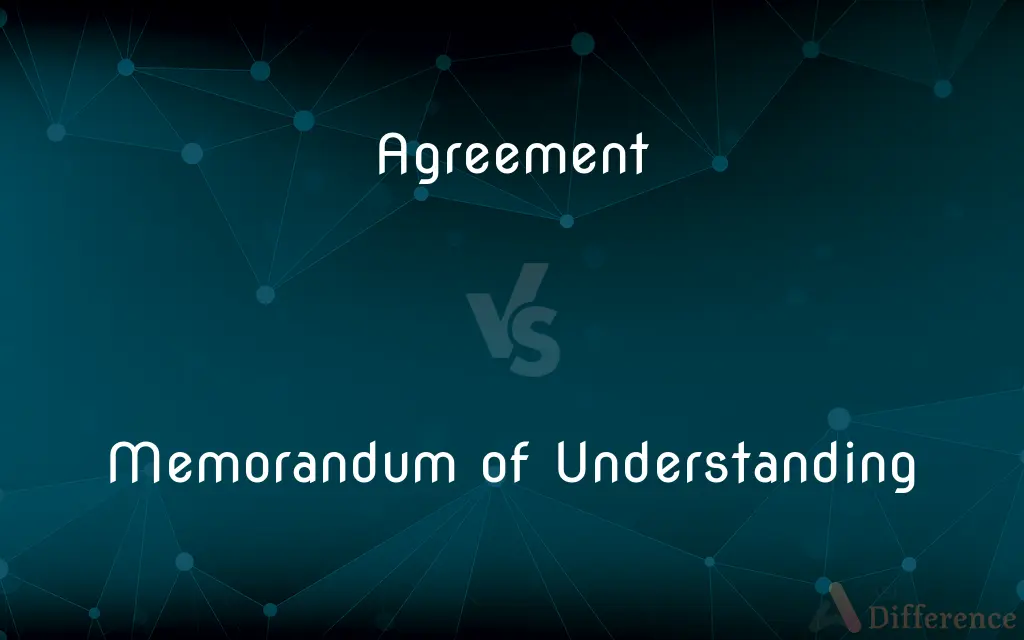Agreement vs. Memorandum of Understanding — What's the Difference?
By Tayyaba Rehman & Urooj Arif — Published on June 24, 2024
An agreement is a broad term for a mutual understanding or arrangement between parties, often legally binding. A Memorandum of Understanding (MOU) is a type of agreement that outlines shared intentions but is usually not legally enforceable.

Difference Between Agreement and Memorandum of Understanding
Table of Contents
ADVERTISEMENT
Key Differences
Agreements encompass a wide range of mutual understandings or contracts between parties, typically with the intent of creating legally binding obligations. These can vary from informal verbal agreements to formal written contracts. In contrast, a Memorandum of Understanding (MOU) serves as a formal document that records the arrangements between parties but often lacks the elements necessary for legal enforceability. While an MOU signifies a consensus on a shared goal or action, it usually outlines cooperation rather than binding terms.
Agreements are used in various legal contexts to ensure that all parties are aware of and consent to their obligations and rights. This could include terms of service, lease agreements, or employment contracts, all of which have specific conditions and are enforceable by law. MOUs, on the other hand, are commonly used in international relations, business collaborations, and between government agencies to document agreements to work together toward a common objective without entering into a legally binding contract.
One of the key differences between an agreement and an MOU is the level of detail and formality. Agreements, especially contracts, are detailed and include terms that are enforceable by law, such as payment terms, confidentiality clauses, and breach consequences. MOUs tend to be less detailed and more about the intention to cooperate, often lacking the specificity and enforceability of contracts.
Despite their differences, both agreements and MOUs play crucial roles in facilitating cooperation and understanding between parties. Agreements provide a legal framework for relationships and transactions, ensuring clarity and protection for all involved. MOUs, while not typically enforceable, establish a framework for collaboration and can be a precursor to more formal agreements.
In practice, the choice between an agreement and an MOU depends on the nature of the relationship and the desired outcome. For legally binding arrangements with clear terms and conditions, an agreement or contract is necessary. For preliminary understandings or to document intentions to collaborate without creating legal obligations, an MOU is appropriate.
ADVERTISEMENT
Comparison Chart
Nature
Can be legally binding.
Usually not legally binding.
Purpose
To outline specific obligations and rights.
To document a mutual intention to cooperate.
Use
Broad, including business, legal, and personal contexts.
Often used in international relations, collaborations, and government agreements.
Detail and Formality
Detailed and formal, with specific terms.
Less detailed, focusing on intention rather than enforceable terms.
Enforceability
Enforceable by law.
Not typically enforceable by law.
Compare with Definitions
Agreement
Legally binding, with specific terms and conditions.
The lease agreement specifies rent and maintenance responsibilities.
Memorandum of Understanding
A document outlining a mutual decision to cooperate.
The universities signed an MOU for academic exchange.
Agreement
A mutual understanding between parties with defined obligations.
The company entered into an agreement with its employees.
Memorandum of Understanding
Indicates intent rather than legal obligation.
The MOU expresses both organizations' intent to collaborate on research.
Agreement
Can be formal or informal, written or verbal.
We have a verbal agreement on the project deadline.
Memorandum of Understanding
Not usually detailed in terms of enforceability.
The MOU outlines the goals but not the legal obligations.
Agreement
Enforceability through legal systems.
The breach of the agreement results in penalties.
Memorandum of Understanding
Often precedes formal agreements.
The MOU laid the groundwork for future contractual agreements.
Agreement
Covers a broad range of applications and contexts.
The trade agreement between the countries was signed last year.
Memorandum of Understanding
Common in international relations and partnerships.
The MOU between the governments will enhance bilateral cooperation.
Agreement
The act of agreeing
When did the agreement take place?.
Agreement
Harmony of opinion; accord
Since we are all in agreement, let's proceed.
Agreement
An arrangement between parties, usually resulting from a discussion, regarding a course of action.
Agreement
A properly executed and legally binding contract.
Agreement
(uncountable) A state whereby several parties share a view or opinion; the state of not contradicting one another.
The results of my experiment are in agreement with those of Michelson and with the law of General Relativity.
Agreement
State of agreeing; harmony of opinion, statement, action, or character; concurrence; concord; conformity; as, a good agreement subsists among the members of the council.
What agreement hath the temple of God with idols ?
Expansion and duration have this further agreement.
Agreement
A concurrence in an engagement that something shall be done or omitted; an exchange of promises; mutual understanding, arrangement, or stipulation; a contract.
Agreement
Harmony of people's opinions or actions or characters;
The two parties were in agreement
Agreement
The verbal act of agreeing
Common Curiosities
Can an MOU become legally binding?
While typically not intended as legally binding, certain elements of an MOU could be considered binding if they meet the criteria of a contract.
Are verbal agreements legally enforceable?
Yes, verbal agreements can be enforceable if they meet the legal criteria for a contract, though proving their terms can be challenging.
When should I use an agreement vs. an MOU?
Use an agreement for legally binding arrangements with specific terms and an MOU for documenting cooperation intentions without legal obligations.
How is an MOU terminated?
Since an MOU is not legally binding, it can be terminated according to the terms outlined within it or by mutual consent of the parties involved.
Can an MOU lead to a contract?
Yes, an MOU often serves as a precursor to a contract, laying the foundation for formal negotiations and agreements.
Is an MOU the same as a contract?
No, an MOU is not the same as a contract. MOUs document intentions to cooperate without the enforceability of contracts.
What makes an agreement legally binding?
An agreement is legally binding if it includes an offer, acceptance, consideration (exchange of value), and mutual intent to be bound.
Can an MOU be used in court?
An MOU can be referenced in court to show the intentions of the parties, but it is generally not enforceable as a contract would be.
Do all agreements need to be in writing?
Not all agreements need to be in writing to be enforceable, but certain types (like real estate transactions) are required by law to be written.
What is the advantage of an MOU?
The advantage of an MOU is that it allows parties to document their intentions to collaborate without committing to the formalities and obligations of a contract.
Share Your Discovery

Previous Comparison
Sweat vs. Sebum
Next Comparison
Grand Jury vs. Petit JuryAuthor Spotlight
Written by
Tayyaba RehmanTayyaba Rehman is a distinguished writer, currently serving as a primary contributor to askdifference.com. As a researcher in semantics and etymology, Tayyaba's passion for the complexity of languages and their distinctions has found a perfect home on the platform. Tayyaba delves into the intricacies of language, distinguishing between commonly confused words and phrases, thereby providing clarity for readers worldwide.
Co-written by
Urooj ArifUrooj is a skilled content writer at Ask Difference, known for her exceptional ability to simplify complex topics into engaging and informative content. With a passion for research and a flair for clear, concise writing, she consistently delivers articles that resonate with our diverse audience.











































